May/June 2019
May and June were busy months here at PiAf, as we finalized our 2019-20 class and welcomed them to Princeton for our 4-day orientation. We are so excited to introduce you to our 20th cohort of Fellows. Hailing from 28 colleges and universities, with degrees from Environmental Science to Finance, the 2019-20 Fellows represent a diversity of backgrounds, skills and experiences that perfectly highlight the growth of PiAf since 1999. Within this class of 48 there are 3 advanced degrees, 18 languages spoken, and 17 citizenships. Over 60% of the incoming class identify as people of color, including 25% who identify as African.
When we welcomed these new Fellows to orientation last week, it quickly became apparent that despite the differences in their backgrounds, they share a common goal to use their fellowships as a means of contributing their skills, growing as professionals and engaging meaningfully and thoughtfully across the African continent. They are a group of open-minded global citizens and young leaders. We are proud to have them join the PiAf family.
We are also excited to be supporting some incredible new host organizations: Mainsprings, Yalelo, Rockies, International Water Management Institute, UNC Malawi Surgical Initiative and Global Livingston Institute.
Please remember to mark October 2nd on your calendars to help celebrate these past 20 years. This milestone reminds us of our starting point, two summer internships in Rwanda, and all the friends, supporters, organizations and alumni who have helped us grow and facilitate over 600 yearlong fellows in 36 countries. We look to the future as well, and continue to imagine new ways in which Princeton in Africa can grow and develop, always changing to incorporate new ways of understanding the global community in which we live.
PiAf Connections
Please click below to check out pictures of our Fellows, Alums and other members of the PiAf family meeting up at home and around Africa.
Notes from the Field
By Tabitha Lumour-Mensah, 2018-19 Fellow with Young 1ove in Botswana
I’ve been living in Gaborone, Botswana for about 10 months now, and it has been amazing how much I have learned in such a short period of time. My fellowship post is at Young 1ove – a nonprofit organization that works to modify and scale evidence-based interventions targeted towards the improvement of youth outcomes in Botswana.
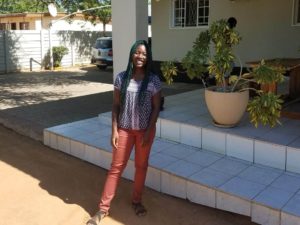
Tabitha in front on the Young 1ove office.
Currently, Young 1ove has two programs: Zones and Teaching at the Right Level (TaRL). Zones, Young 1ove’s health program, aims to decrease new HIV infections in young girls by encouraging them to avoid relationships with older partners who are more likely to carry the virus. Young 1ove’s other program is a remedial education program called TaRL that focuses on increasing numeracy in primary school aged learners.
My role is based in the office, so I am involved in the administration behind Young 1ove’s programs. Being able to do this has been a great opportunity for me to gain a greater understanding about the planning and everyday administrative work that is necessary to keep an organization running. I’ve been involved in everything from helping to plan a staff retreat, to managing the HR related administration work, to keep the organization growing. I’ve come to appreciate how important the back-end work is.
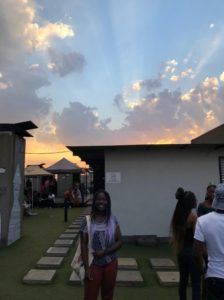
Tabitha in Johannesburg during a trip I took with the other Gaborone PiAf fellows.
This year has been a really big one for Young 1ove. 2019 is the first year that Zones and TaRL started running concurrently, the year that the number of office and field staff reached their highest numbers, the year that Young 1ove was named an innovation hub for Teaching at the Right Level and Young 1ove’s 5th birthday.
To celebrate Young 1ove’s 5th birthday, the team split up into 5 groups—each group assigned one of Young 1ove’s five values. For one week, each group completed various tasks related to their delegated Young 1ove value. Being able to work with people in the office that I don’t usually interact with because we were assigned to the same team was a really good way to remind myself how amazing the Young 1ove staff is and how happy people are to put a smile on someone else’s face. My personal favorite idea was the “Positivity” team’s coupons for things like warm hugs, lovely compliments and dry jokes.
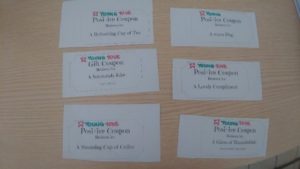
Positivity coupons in honor of Young 1ove turning 5! My favorite was the warm hug.Being able to be a part of the Young 1ove team during this time has been so exciting and I can’t wait to see what Young 1ove is up to on their next birthday!
Notes from the Field
By Uma Guarnaccia, 2018-19 Fellow with Kucetekela Foundation in Zambia
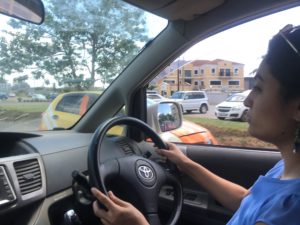
Uma navigating traffic in Lusaka to conduct student visits.
Muli Bwanji! I have now been living in Lusaka and working at Kucetekela Foundation for six months. My time here so far has been filled with long days in our office, quality time with our brilliant and thoughtful high school students, numerous pink-orange-yellow Lusaka sunsets, plentiful Nshima lunches, and building meaningful relationships with those around me. There is so much beauty in Lusaka and throughout Zambia that I have come to appreciate these last six months, most of which has been appreciated while driving around.
My job, or a day in the life, as Programs Coordinator at KF has consisted of office work, as well as visiting our high school students at our two partner schools and our gap year students/alumni at their many job locations throughout Lusaka. I facilitate our various leadership and youth development and capacity building programs with our high school students, and assist our gap year students with their applications to different tertiary programs around Zambia and the world. This means that I usually spend my mornings in the office catching up on forms and emails that need to be filled out and sent, and the afternoons driving all around Lusaka getting face time with our KF students and alumni.
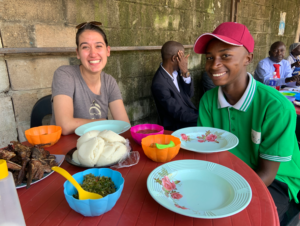
Enjoying Nshima for lunch with two colleagues (including KF 17-18 Fellow Mina).
It was while driving, especially in my first couple of weeks and months, that I learned about all things KF and Lusaka. In the car my colleagues had ample time to reflect on their experiences, give me valuable insight in to how to do my job as Programs Coordinator to the best of my abilities, and how best to navigate Lusaka. I was quickly able to see for myself which areas each of our students lives in and/or conducts community service in, where the primary schools they attended before they joined the KF family are, and where their internships take place. For the past six months, this has really allowed me to have a deeper understanding and appreciation of what my role at KF means.
Whether it is appreciating the bright and colorful vegetation that lines the city streets, the sun setting over the skyline, or reflecting on thoughtful conversations had with students, I am eager to continue moving through the city and keep finding beauty in every corner of Lusaka.
Notes from the Field
By Clare Holtzman, 2018-19 Fellow with Indigenous Education Foundation of Tanzania
I learned I was white when I was five years old and living in Kenya for a year, hearing myself addressed as “mzungu” no matter where I was in the country, and hearing the frequent demand, “give me sweets,” especially from houseless children in Nairobi. Being labeled by one’s race is not a familiar or comfortable feeling, especially for those of us who are white, and from a predominantly white country, where we are therefore taken as the default. According to identity philosophy, we have been socialized in western countries to view identities as normal/not normal; and therefore with respect to race, those who are “white” (and thus privileged), and those who are not white. While it is jarring to be identified by race for the first time (and perhaps for the only time in one’s life), it is important to acknowledge that for many others in the United States back home, this is a daily and lifelong experience.
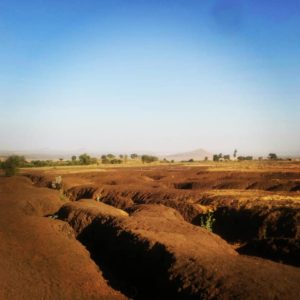
Views on the way to visit a student’s Boma.
Before beginning my fellowship, I considered what my purpose would be here at IEFT, what impact I could make, and on whom the impact would be made. In education, educators have a direct responsibility to care for students to the best of one’s abilities. At the same time, as anyone who has worked in education knows, the impact you can make on students in a single year may be modest, although we do hope to make a positive difference in unforeseen ways. How then do I view the importance of my work, as a young white woman?
Returning to East Africa, I was greeted again, by the mzungu label, from adults, not just students. While at times frustrating, I have found this to be an important reminder of my positionality in my community. I am a white woman, from a country that benefits economically from post colonialism, and working at a school in Tanzania for a single year, where I may gain more benefits from the experience than I can give back to the community. What I take from this recognition, and from my positionality, is a responsibility to invest my experience into a future career where I can make a broader impact in the education system in East Africa. Additionally, however, it awakens me to the obligation, as well as desire, to be a positive influence throughout my year here. My hope is that even small actions may have unforeseen positive effects. I have tried to make an impact by listening to the students who are not often heard, or fumbling my way through teaching music for the first time, and modeling positive growth behaviors by admitting when I have made a mistake or don’t know something. At the same time, my students have made an even bigger impact on me, by challenging my assumptions and reminding me to ask them as many questions as I expect them to ask of me.
Notes from the Field
By Alumni Shaquilla Harrigan 2016-17, Sarah Rogers 2013-14, and Bjorn Whitmore 2012-13
We are beyond excited to announce that we will be launching the official PiAf Alumni Board this fall! The Alumni Board’s purpose is to support the mission and success of Princeton in Africa and its alumni by: representing the interests and experiences of past Fellows; enhancing the connectedness of PiAf alumni; strengthening the relationship between PiAf alumni and current Fellows; and supporting Princeton in Africa’s development work.
Over the past year, over 70 alumni contributed their ideas and feedback on how the Alumni Board could support the interests of alumni and Princeton in Africa alike, and we have heard from many more about their excitement for this new initiative.The Alumni Board committee built on these contributions to develop a vision, structure, and formal bylaws for the Alumni Board.
In May 2019, the Board of Directors formally approved the Alumni Board and its bylaws, and the Alumni Board was officially announced on June 17th. Elections for the Alumni Board will be held this summer, with the goal of establishing the first Alumni Board by September. For PiAf alumni interested in running for the Board, you can submit your name or that of another alumnus using this form. All nominations are due by July 8th.
We would like to thank all the PiAf alumni who have contributed to making the Alumni Board a reality. The PiAf alumni network is a diverse and passionate group of individuals, ranging from recent Fellows to those who completed their fellowship nearly 20 years ago, and we are thrilled to see this growing community become an ever more important part of Princeton in Africa!
PiAfLove,
Shaquilla Harrigan, PiAf 2016-2017, AWARD/ICRAF, Kenya
Sarah Rogers, PiAf 2013-2014, African Impact, Zambia
Bjorn Whitmore, PiAf 2012-2013, Lutheran World Federation, Burundi





